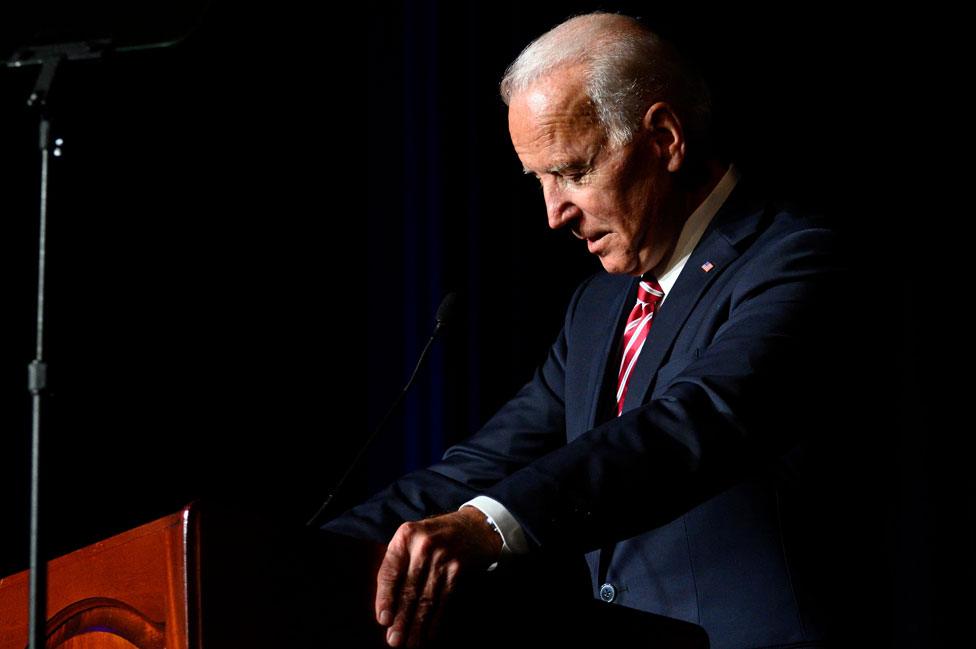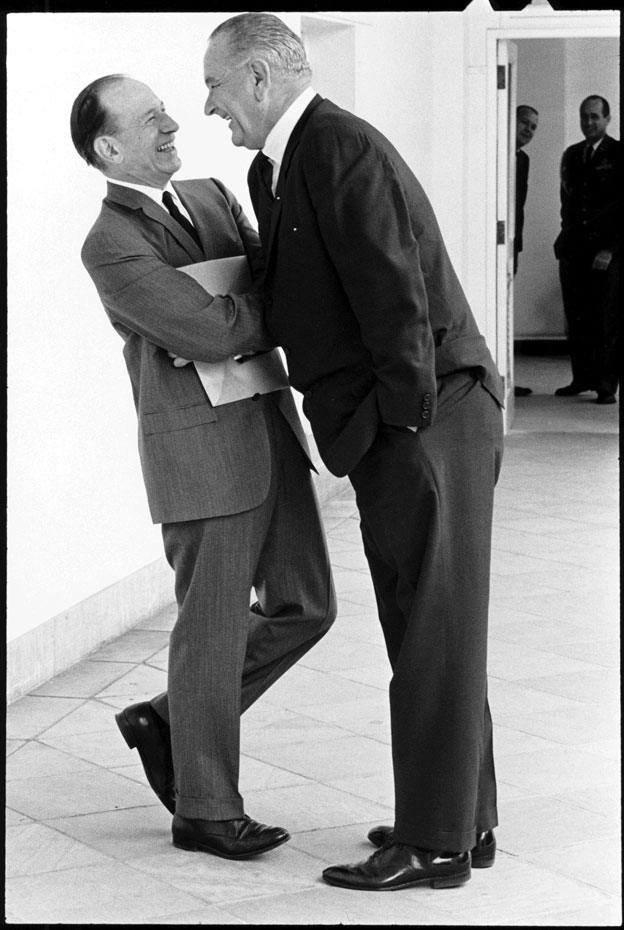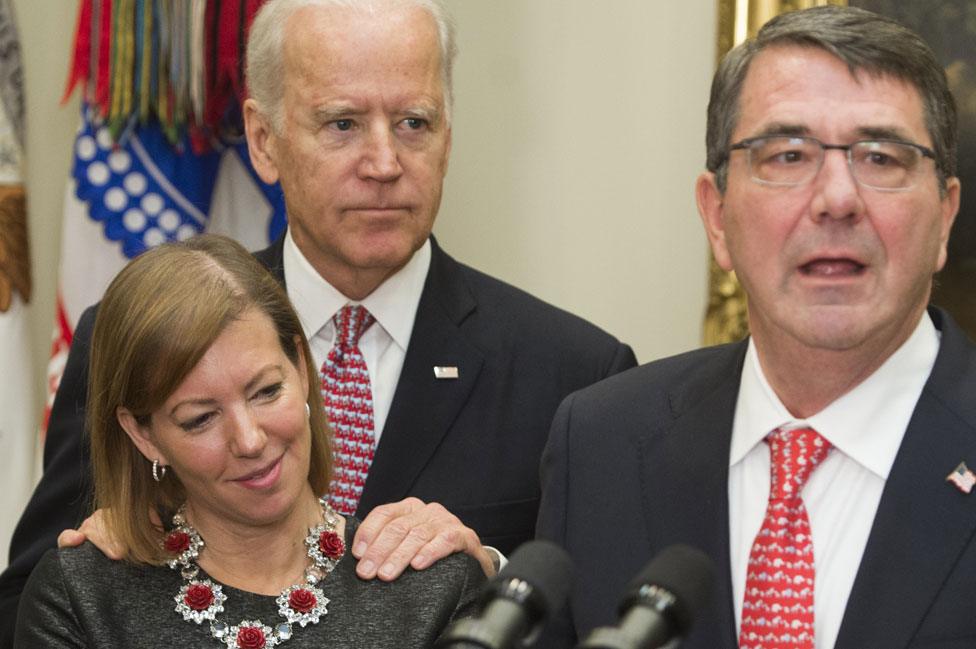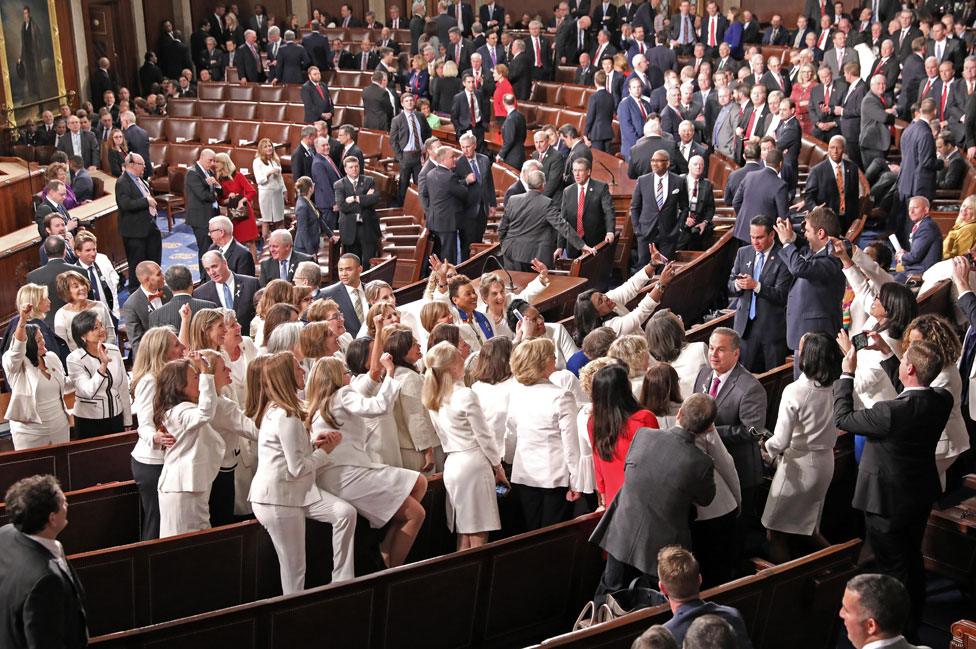Joe Biden: A frontrunner stumbles in the age of #MeToo
- Published

The most damaging political scandals are usually those that draw attention to an existing vulnerability in a candidate's public persona.
The Hillary Clinton email controversy reinforced a reputation for evasion and also the sense the Clintons did not feel bound by rules that applied to lesser mortals.
When during the 2012 campaign a tape emerged of Mitt Romney castigating the 47% "dependent on government", it seemed to confirm this former venture capitalist was a heartless "one percenter" lacking in empathy for the victims of the Great Recession.
The allegations against Joe Biden, that he touched two women inappropriately, magnify and multiply a pre-existent image condition: that he's an old white man, who seems to defy the zeitgeist; a dinosaur who does not fully understand the meteor effect of the #MeToo movement.
"Loveable Uncle Joe", the supposed darling of the Rust Belt, has morphed into "creepy uncle Joe", an online pariah. His nascent presidential candidacy is imperilled even before he has officially announced his bid.
The 76-year-old has long been one of Washington's more gregarious and likeable figures. At a time when politicians were expected to be tactile to demonstrate their fealty with voters, he more than met that requirement.
But his rules of physical engagement appear to stem from a bygone era.
This former lawmaker, who represented the state of Delaware for 36 years, came of political age on Capitol Hill at a time when the lions of the Senate used almost to maul each other in mutual displays of affection and collegiality.
In a male-dominated chamber, greetings between senators sometimes looked more like mating rituals.
Often they would start with the firm grasp of a hand, move onto the grip of an elbow, then progress to the rub of a shoulder and finally be consummated with a bear hug.
Perhaps we should call it the Biden treatment.

LBJ wasn't known for respecting personal space

It is easy to see why women would feel uncomfortable with these kind of "hail-fellow-well-met" customs. Personal space is invaded. Boundaries violated. Old school charm comes across as a Boys' Club chauvinism - an invasive power play.
Now, after Lucy Flores told her story on Friday about Biden kissing the back of her head, another woman has accused him of making her feel uncomfortable.
"It wasn't sexual, but he did grab me by the head," Amy Lappos told The Hartford Courant, external, recalling what happened at a fundraiser in 2009.
"He put his hand around my neck and pulled me in to rub noses with me. When he was pulling me in, I thought he was going to kiss me on the mouth."
Supporters, such as Meghan McCain, the daughter of the late Senator John McCain, have testified to Biden's kindness and thoughtfulness, a widely-shared view in Washington.
Stephanie Carter, the wife of the former Defence Secretary Ashton Carter, has said a now infamous photo showing the then vice-president gripping her shoulders has been used misleadingly.
"The Joe Biden in my picture is a close friend helping someone get through a big day, for which I will always be grateful," she told Medium, external. "So, as the sole owner of my story, it is high time that I reclaim it - from strangers, Twitter, the pundits and the late-night hosts."

Stephanie Carter felt comforted by Joe Biden, in a photo that was widely misconstrued
Biden's own story is founded on the belief he has never acted inappropriately in all the "countless handshakes, hugs, expressions of affection, support and comfort" during his many years in public life, as he put it in a statement.
A problem is that the black and white, heroes and villains paradigm of modern-day public shaming struggles to accommodate these kind of more nuanced storylines. Red and blue America does not do well with areas of grey, or the spectrum of wrongdoing.
His handling of the Clarence Thomas hearing in 1991 also brings back to the fore a troubling backstory.
As the then chairman of the Senate Judiciary Committee, he faced criticism for not providing African-American law professor Anita Hill with what would today be called a safe space, as she appeared before an all-white and all-male committee to outline her allegations of sexual harassment against the Supreme Court nominee.
Biden also refused to hear testimony from other witnesses who might have corroborated her story, something for which he had already delivered a mea culpa - although critics have long claimed he has never made proper amends.

Read more from Nick

It is worth reflecting on Biden's first failed bid for the presidency in 1988, when he was forced to withdraw from the race after he was found to have plagiarised a speech by the British Labour party leader Neil Kinnock. Back then the bar for disqualification was relatively low.
Senator Gary Hart, the early frontrunner, dropped out of the race because he was found to have had a sexual liaison with Donna Rice onboard the boat Monkey Business.
Such was the censorious mood of the times, and the paramount importance of what was labelled "the character issue", that Bruce Babbitt, another candidate, appeared in a parody on Saturday Night Live to confess to "injudicious use of grocery store express lanes".
Four years later, however, Bill Clinton re-wrote the rules by demonstrating that politicians could survive sex scandals, and even the accusation of draft dodging. Indeed, the ability to survive scandal, and to walk away from political car crashes, almost became a prerequisite for a successful presidential run.
George W Bush demonstrated this in 2000 - just - when he survived the revelation he had been arrested for driving under the influence of alcohol.

A new wave of women politicians has changed the face of Congress
Eight years later, Barack Obama weathered the storm surrounding his former pastor Jeremiah Wright, a row that could easily have scuppered him. Survivability became an integral part of the modern political skillset, as Donald Trump demonstrated again after the release of the Access Hollywood tape.
Not only did he go on to win the presidency, but a majority of white female voters. It made his famous boast that he could shoot someone on Fifth Avenue without inflicting political self-harm sound like a prophecy.
Now, though, on the Democratic side at least, the mood has changed. Primary voters will surely be less sympathetic to Biden than they were to Clinton in 1992.
This, after all, is the spring of 2019, and we are still in the wake of the pink wave that returned Nancy Pelosi to the speakership, elected a record-breaking number of women to Congress and helped make Alexandria Ocasio-Cortez the most talked about progressive politician in America.

Who will take on Trump in 2020?

Mr Biden has yet to jump into the race, but plenty have. So who else has a shot at becoming the next president?

It is also worth pointing out that male journalists, who helped popularise phrases like "bimbo eruptions" back in the early Nineties, no longer control campaign narratives to anywhere near the same extent they did back then.
This felt like a controversy waiting to happen, as evidenced by the speed with which news organisations published "Creepy Joe" photo galleries showing Biden in seemingly compromising poses.
But what makes it so riveting is that it feels like one of the intermittent moments in American national life when rules of behaviour are determined, or reinforced, which reflect not just a generational shift in thinking but also a gender-influenced shift in thinking.
An irony here is that Biden has already been present in two of these previous transitional moments: the 1988 campaign, which for a brief moment made it harder for adulterers and other wrongdoers, to become president; and the Clarence Thomas hearings, which altered thinking about how allegations of sexual harassment should be handled.
Supporters of Joe Biden could plausibly argue the former vice-president remains the most electable Democrat, largely because of his appeal in the three states the Democrats most need to turn blue - Michigan, Pennsylvania and Wisconsin.
But winning the presidency is a wholly different matter from winning the presidential nomination in a party that has moved leftward with charismatic women in the fore.
Biden may struggle to become the figurehead of a party that may well regard him as a throwback.
Besides, at the age of 76, it gets harder to become a Comeback Kid.